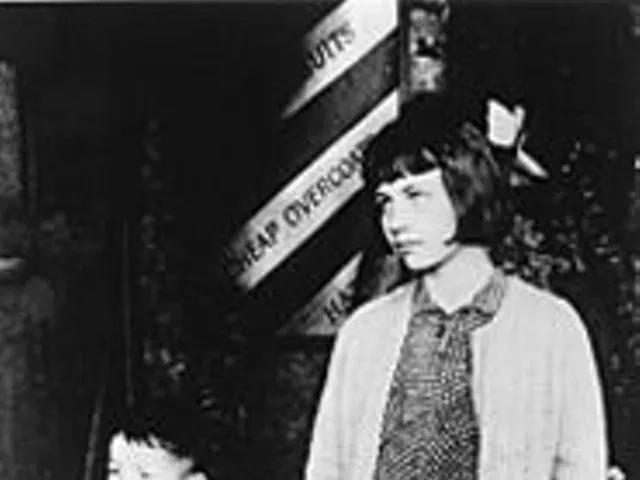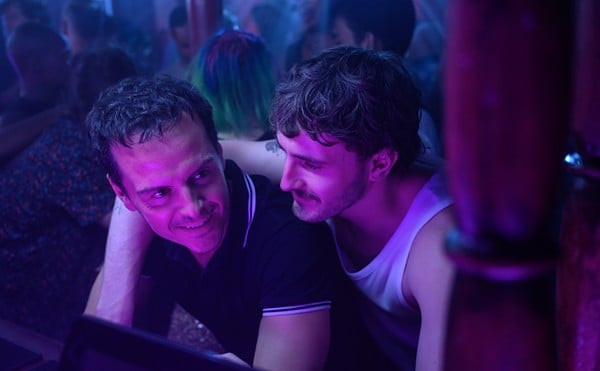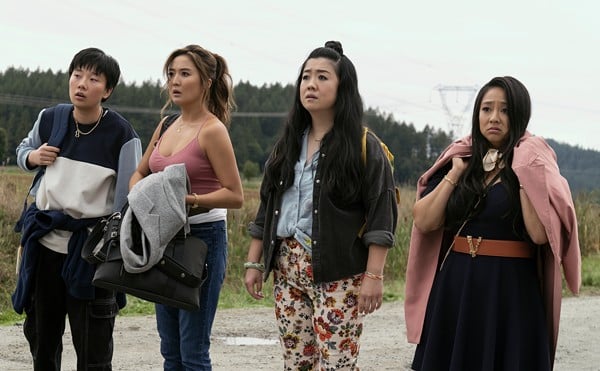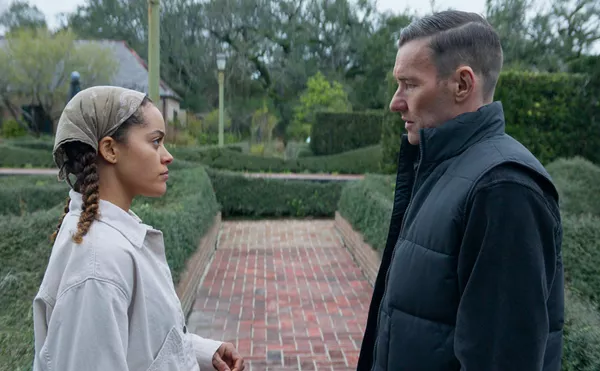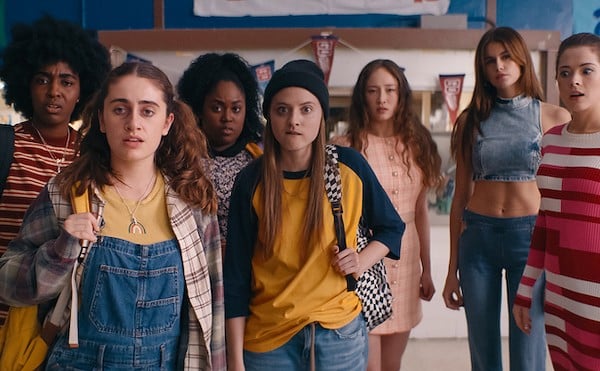Things start out promisingly enough, with some jarring sock-hop title imagery leading to a moody nocturnal swing along the eponymous thoroughfare high above Hollywood. Longtime Lynch composer Angelo Badalamenti sets the morose tone as a mysterious and beautiful woman (Laura Elena Harring) narrowly escapes death in her limousine and stumbles down the mountain in shock toward some rather questionable goings-on.
Dawn finds the city in its usual disarray, with a peculiar man interrogating a feisty young fellow about a nasty dream that's been haunting the lad. The setting is pure Lynch -- a diner called Winkie's on Sunset Boulevard -- and there's something unbearably horrible lurking out back that the young man needs to check out. Could it be a guy in a cheap monster mask rendered blood-chilling by an abrupt cut? Maybe.
Meanwhile, a chipper young woman named Betty (Naomi Watts) is arriving in town from purer lands, anxious to make her mark as an actress. Looking forward to the comfort of a chic retro apartment while her generous aunt is out of town, Betty is surprised to find the aforementioned mystery woman naked in the shower. Stealing her name from a poster of Rita Hayworth, the enigmatic bather makes known her amnesia and reveals a hot-and-botheredness that leads us to wonder how soon the two will engage in sexy shenanigans. The answer: soon enough, twice, and, friends, it's worth the price of admission.
Playing like cinematic comfort food for the faithful, Mulholland Drive is Lynch at his most predictable and inscrutable, which is to say he's dancing to his own beat. The movie isn't as consistent as the director's heavy hitters, such as Twin Peaks: Fire Walk with Me or Lost Highway, but it includes great moments of dark delirium reminiscent of those films. Likewise, thanks to cameos from Robert Forster and Dan Hedaya, the project boasts dry, laconic humor to spark fond memories of Blue Velvet and Wild at Heart.
Originally conceived and shot as a somewhat bumbling television pilot, the project was nurtured by prolific French producer Alain Sarde (who has shepherded works by Godard and Polanski) and resurrected as this self-contained feature. As a result, the bulk of the movie looks and feels like episodic television, with fair-to-good production values and tidily interwoven subplots. Then, near the end, a transition occurs wherein everyone suddenly looks a little older and the screen looks more like money. Loose ends are abruptly tied or discarded, and although Lynch's screenplay is more or less comprehensible, one still emerges a bit dazed.
Although this road may contain too many potholes -- and plot holes -- to sustain an even ride, moments of greatness are scattered throughout to remind us why Lynch is vital and why the French think he's so nifty. Take, for example, a spooky and wry midnight rendezvous with the Cowboy (Lafayette Montgomery) or an absolutely heavenly scene in which Billy Ray Cyrus gets a big dose of his own achy-breaky medicine. Better still is a scene of dreamy genius involving a nighttime cabaret called Club Silencio, visited by Betty and Rita, where Rebekah Del Rio croons a uniquely twisted version of Roy Orbison's "Crying." Utterly enthralling.
And then there's some crap, scenes so tedious it's hard to believe they're part of the same movie. For reasons more mysterious than the plot itself, we get run-of-the-mill true-crime schlock, the unhappy ruminations of a young hack director (Justin Theroux) and assorted scrap heaps of stilted dialogue and irritating non sequiturs. There's humorous leavening in the form of Betty's eccentric landlord, Coco (Ann Miller), and some cheesy doowop vocalizing, but the excision of 45 minutes of mediocrity would have made the rest of the film stand out and sparkle.
Speaking of sparkle, Naomi Watts clearly has something the cinema desperately needs. Ever since she starred as Jet Girl in Tank Girl (my Best Picture of 1995 -- deal with it), the actress has been on a roll, and Mulholland Drive features her finest work yet, with beastly passions framing coy sweetness framing more beastly passions. Whether she's protecting Rita from unknown evils, absorbing her soul or cutting loose in an audition that zigzags wildly between poetry and porn, Watts is electrifying.
Because Lynch's modus operandi seems to be to turn our worlds upside down, it only adds to the fun to perceive his work as a series of big, bizarre home movies. But, like flipping through the sketchbooks of a revered artist, Mulholland Drive reveals too many scribbles to inspire awe, and at its worst it feels like an LA-obsessed outtake reel from The End of Violence. However, a little patience makes a world of difference, rendering Lynch's explicit portrait of Betty all the more engrossing and revelatory. Like many dreamers in Hollywood, she's just playing with herself. And crying.

